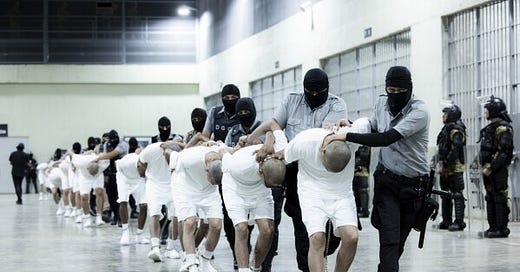The Real Reason Gangs Like Tren de Aragua Keep Growing—And It’s Not What You Think
What if the United States is to blame for the existence of violent gangs?
President Donald Trump irked more than a few folks on the left after he invoked the Alien Enemies Act to deport over 200 illegal immigrants from Venezuela. More than half were suspected of belonging to Tren de Aragua, one of the most brutal street gangs in the country.
The deportations occurred on Saturday evening as the authorities flew the individuals to El Salvador. The nation’s president, Nayib Bukele, agreed to accept the deportees and placed them in a maximum-security prison. The United States paid El Salvador’s government $6 million for their troubles.
Trump and his allies defended the move, arguing that these individuals posed a threat to national security. The Alien Enemies Act empowers a president to detain or deport immigrants from countries that are at war with the United States. The law allows for this to be done even without due process or judicial proceedings. Those who oppose the move argue that Venezuela and the U.S. are not in a war.
U.S. District Judge James Boasberg on Saturday issued a temporary restraining order blocking the deportations. The ruling came as the result of a lawsuit filed against the Trump administration by the American Civil Liberties Union and other organizations. However, the plane was already airborne, which means the migrants are now in El Salvador.
Democrats have excoriated the White House over this development, accusing the president of overreaching.
Regardless of what side you fall on with this story, it is clear that gangs like MS-13 and Tren de Aragua exist – and they are dangerous. Both gangs make the bulk of their income from human smuggling and trafficking, extortion, and illicit drug distribution. It is believed that most of their funds come from drugs, meaning that the War on Drugs is essentially helping these organizations terrorize the communities they infest.
Indeed, the War on Drugs has always been a boon to organized crime. Since the government began treating drug users and sellers as criminals, these gangs have cultivated lucrative black markets that cartels and other gangs eagerly exploit.
Whenever the state bans a product or service that is in high demand – like drugs – less savory outfits step in to fill the void. Since the demand does not dissipate, these enterprises rake in tons of cash by selling drugs at higher prices. In this way, the government has essentially enabled all the crime these entities commit.
Much of the murders and thefts perpetrated by these organizations are related to drug trafficking just as it was under alcohol prohibition.
But imagine what would happen if narcotics were legalized and sold in American businesses? It would all but completely eliminate illicit drug trafficking instantly. For gangs like MS-13 and Tren de Aragua, it would not completely destroy their businesses, but it would cause immense damage to their cash flow. They would be limited to other illicit activities.
Moreover, it would mean that those who consume narcotics would not have their lives ruined by a government that would rather lock them in cages than seek actual solutions to addiction. By the way, using a different approach like Portugal, which decriminalized drugs, would go much further to helping people break their addictions than simply locking them up.
It is also worth noting that while drug use can be quite devastating for those who abuse them, the vast majority of those who use cocaine, meth, and other substances do not form addictions or end up on the street.
Yes, I know you don’t believe me. But don’t worry, I’ll be creating more content on this that will convince you!
The War on Drugs has funneled billions upon billions to violent, evil organizations across the globe – but especially in South America. Indeed, the U.S. government’s decision to force other nations to launch their own anti-drug crusades has devastated the lives of countless people in the U.S. and abroad.
It’s time for something different.
We have already seen that the War on Drugs has not worked. Despite pouring at least a trillion dollars into this endeavor, more people are addicted today than they were before the war started. More people are dying from overdoses today than during the crack epidemic. Believe it or not, this is the case even when you remove fentanyl from the equation. You can read my breakdown of this here.
By eliminating the drug war, we can free up law enforcement so it can focus on violent and property crimes. They can do more to stop human trafficking, homicides, burglaries, and other types of offenses. Indeed, the murder and theft rate would go down since a considerable chunk of these are motivated by illicit drug trafficking.
Yes, legalizing drugs is a radical idea. But dealing with crime and addiction requires radical solutions.
Moreover, these approaches have already produced positive results in countries like Uruguay, Switzerland, Portugal, and others. At this point, it is impossible to argue that using violence and the threat of violence to stop people from becoming intoxicated is the most effective method. We are at a moment where Americans need healthier solutions. Perhaps one day the rest of the country will come around.





Great Point. I made a similar observation but more so on a cultural level regarding black gangs in America here. [Black Privilege and The Commoditization of Drill Music] https://torrancestephensphd.substack.com/p/black-privilege-and-the-commoditization
Thanks for highlighting the terrible destructiveness and pointlessness of the drug war.
"Yes, legalizing drugs is a radical idea."
It seems so to America today, but at the time of our founding, it was recognized that people are responsible for their own lives and their own choices. Which they still are, whether or not they acknowledge it.